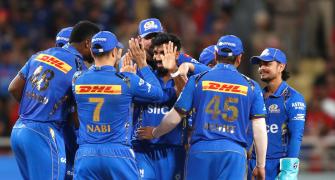De De Pyaar De is a radio play being passed off as a motion picture, says Sreehari Nair.

To sit through a movie like De De Pyaar De is to give up all will to write about it.
There are some films whose very style may seem antipathetic to the medium and, thus, to film criticism.
This is one such film.
At a certain point in this Akiv Ali-directed bedroom farce, with Jaaved Jaaferi and Ajay Devgn engaging in a rat-a-tat routine, I decided to shut my eyes and let the voices of the actors wash over me.
And guess what? I didn’t miss a thing.
As a matter of fact, I felt I was in the presence of a better movie.
It’s then that it dawned upon me: What we have here is a radio play being passed off as a motion picture.
And so the bitter truth that permeates the whole of De De Pyaar De: there are no reasons for you to look up at the screen.
This is a movie you can watch while painting your toenails; there’s hardly anything visual in it.
The back-and-forth are all verbal.
Each punchline cuts to a counterpunch, which then cuts to a counter-counterpunch... and this way the sickness spreads.
You don't get the pleasure of watching an actor perform -- nobody’s reacting to situations; they're merely lining up their faces for the camera.
And the camera movements? Oddly enough, they are verbal too.
Because every time the camera moves, jerkily, and in ways that are totally inappropriate to the spirit of the scene, I could hear Akiv Ali whispering in my ear, “Did you see that? I just moved the camera."
In effect, to respond to a movie like De De Pyaar De, one may have to take stock of the opportunities missed.
Actually, the filmic outline isn’t bad: the first half was, perhaps, planned as a raunchy battle-of-sexes and the second half, an extended catfight.
Good, imaginative sparring is good for the health of cinema but all we have here is one insult for each half, reproduced over and over again, by a battery of epigrams.
Ashish Mehra (Devgn) is 50, Ayesha Khurana (Rakul Preet Singh) is 26. She makes fun of his vanity and he, of her inexperience.
And then some.
Manju (Tabu) is Ashish’s legal wife, now separated; Ayesha is the usurper -- so the young one makes fun of the old wife’s sagging anatomy and she, in turn, of her general immaturity.
And then some.
The taunts are played out on loop, while performers like Jaaferi, Jimmy Sheirgill and Kumud Mishra come on the scene and act as though there’s nothing more to their lives than taking an interest in the affairs of Ashish, Ayesha and Manju.
Luv Ranjan, who has written and produced this one, is often taken for a misogynist. In truth, he’s just a guy bored of political correctness.
Ranjan, this time, is out to question a liberal thinking, now fashionable -- that our parents are all corrupt, rotten and ‘cultural uptights’ and that there’s a sense of innate purity about us -- among this present generation.
This self-glorification (evident in shows such as Made In Heaven) is the thing Ranjan mocks here: he makes his oldies and supposed fuddy-duddies ‘cool’ and ‘wise’ and turns the young ones into nutbirds.
In its own right, Ranjan’s approach is a radical one but the atmosphere is arch and uninvolving and the characters have clearly been developed to fit the public image of the actors and not shaped as pure characters.
In our heart of hearts, we think of Ajay Devgn as emotionally inaccessible (this may even be a part of his charm, we secretly believe).
This public perception of Devgn is all there is to his character of Ashish; and the actor himself seems uninterested in giving it any more shading.
Rakul Preet Singh is sincere, though it's hard to believe she could ever be any kind of threat to Tabu, whose reputation as the finest actress of her generation is enough to grant her all the long shots there are in this feverishly-edited film.
It’s often said, 'If your characters are developed, the plot will take care of itself.'
In this film however, not one character is alive and almost every one of them has been overlaid on the pre-arranged plot.
And who moves the plot in the second half? It’s Ishika, Manju and Ashish’s daughter, perhaps the snarkiest character in the history of Indian cinema.
If you share my instincts, every time Ishika barges in, shrieking and flaring her nostrils, you would probably wish for her parents to get back together just to wham her one.
I thought the movie might be better as a radio play, but every single time the smug girl is on screen, you would want both the picture and the sound to be blanked out.
She kills a dead movie, many times over.











